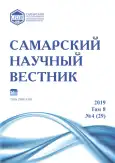FMEA-анализ социально-профессиональной компетентности в структуре мониторинга личностно-профессионального развития студента
- Авторы: Лялюк А.В.1, Шапошникова Т.Л.1
-
Учреждения:
- Кубанский государственный технологический университет
- Выпуск: Том 8, № 4 (2019)
- Страницы: 258-262
- Раздел: Педагогические науки
- URL: https://journal-vniispk.ru/2309-4370/article/view/34501
- DOI: https://doi.org/10.17816/snv201984306
- ID: 34501
Цитировать
Полный текст
Аннотация
В статье рассматриваются возможности использование математических моделей в процессе информатизация образования. Обосновано, что FMEA-анализ компетенций и личностно-профессиональных качеств студентов может стать обязательной составляющей психолого-педагогического мониторинга. Отражены возможности FMEA-анализа в социально-педагогическом сопровождении личностно-профессионального развития. FMEA-анализ позволяет выявлять «критические точки» становления социально-профессиональной компетентности студента, т.е. идентифицировать, диагностировать и прогнозировать риски его личностно-профессионального развития. Установлена взаимосвязь FMEA-анализа социально-профессиональной компетентности с иными составляющими психолого-педагогического мониторинга (в том числе SWOT-анализом). Достоинство FMEA-анализа в том, что он позволяет оценивать не только стационарную, но и динамическую устойчивость компетенций и личностно-профессиональных качеств. Методологическими основами исследования явились социологический, системный, вероятностно-статистический, квалиметрический, компетентностный и синергетический подходы. Методы исследования: анализ научной литературы и передового опыта психолого-педагогического мониторинга, моделирование, квалиметрия (теории латентных переменных), методы теории множеств, методы теории вероятностей и математической статистики и раздел дискретной математики – теория графов. Теоретическая значимость результатов исследования – в возможности дальнейшего научного осмысления проблем становления конкурентоспособной личности в системе непрерывного образования; практическая значимость – в возможности построения инновационных систем и технологий психолого-педагогического мониторинга.
Полный текст
Открыть статью на сайте журналаОб авторах
Александр Викторович Лялюк
Кубанский государственный технологический университет
Автор, ответственный за переписку.
Email: fskn_lav@mail.ru
кандидат педагогических наук, доцент, заведующий кафедрой физического воспитания и спорта
Россия, КраснодарТатьяна Леонидовна Шапошникова
Кубанский государственный технологический университет
Email: shtale@yandex.ru
доктор педагогических наук, профессор, директор института фундаментальных наук, заведующий кафедрой физики
Россия, КраснодарСписок литературы
- Богословский В.И., Аниськин В.Н. Роль и место холистической информационно-образовательной среды на этапе цифровизации процессов обучения и воспитания личности // Самарский научный вестник. 2018. Т. 7, № 4 (25). С. 305–311.
- Булгаков Ю.В., Комаров А.П., Шестернина В.В. Оценка результатов учебной деятельности студента и структура рейтинга // Общество: социология, психология, педагогика. 2018. № 6. С. 49–55.
- Григораш О.В. Современные подходы к оценке сформированности компетенций студентов технических вузов // Общество: социология, психология, педагогика. 2018. № 10. С. 106–110.
- Черных А.И., Шапошникова Т.Л., Хорошун К.В., Романов Д.А. Мониторинг качества и эффективности непрерывного профессионального образования. Краснодар: КубГТУ, 2016. 264 с.
- Lust M., Huber C., Junne J. Academic Identity as a Discursive Resource for Resistance: The Case of Quality Management in German Higher Education Institutions // Higher Education Policy. 2019. Vol. 32, № 1. P. 49–69.
- Sanagavarapu P., Abraham J., Taylor E. Development and validation of a scale to measure first year students’ transitional challenges, wellbeing, help-seeking, and adjustments in an Australian university // Higher Education. 2019. Vol. 77, № 4. P. 695–715.
- You J.W. Testing the three-way interaction effect of academic stress, academic self-efficacy, and task value on persistence in learning among Korean college students // Higher Education. 2018. Vol. 76, № 5. P. 921–935.
- Казакова Е.И., Тарханова И.Ю. Об измерении сформированности универсальных компетенций студентов вузов // Педагогика. 2018. № 9. С. 79–83.
- Шацкая И.В. FMEA-анализ процессов в работе образовательной организации // Экономика и предпринимательство. 2018. № 3 (92). С. 1028–1031.
- Леньков С.Л. Трехуровневая психолого-педагогическая модель личности // Педагогика. 2018. № 6. С. 12–22.
- Лялюк А.В., Тучина О.Р. Исследование факторов риска образовательной среды современного вуза: позиции студентов // Вестник Адыгейского государственного университета. Серия «Педагогика и психология». 2018. № 3 (223). С. 57–65.
- Голубь М.С. Модель педагогического предупреждения виктимизации и насилия над подростками // Общество: социология, психология, педагогика. 2018. № 5. С. 104–107.
- Лялюк А.В. Периодизация в развитии стратегии и тактики антинаркотической профилактики в зарубежных странах // Вестник Санкт-Петербургского университета МВД России. 2010. № 3. С. 129–133.
- Lukyanova M.I., Donina O.I., Aryabkina I.V., Kovardakova M.I. Main tendencies and forming factors of the teacher’s professional readiness in the context of the person-centred educational paradigm // Journal of Fundamental and Applied Sciences. 2018. Vol. 10, № 6S. P. 1582–1592.
- Изотова Л.Е. Современные методы диагностики поведенческого компонента компетенций и личностно-профессиональных качеств // Ученые записки университета им. П.Ф. Лесгафта. 2018. № 11 (165). С. 117–121.
Дополнительные файлы






